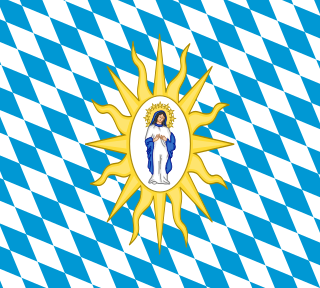See also
- German Legion (disambiguation), sometimes called "German Army"
- Heer (disambiguation), the German term for land army
The German Army is the land component of the armed forces of Germany and previously West Germany.
German Army may also refer to:
Diet may refer to:
The military of Germany refers to the Bundeswehr, the current armed forces of Germany since 1955.

The Holy Roman Empire, also known as the Holy Roman Empire of the German Nation after 1512, was a polity in Central and Western Europe, usually headed by the Holy Roman Emperor. It developed in the Early Middle Ages and lasted for almost a thousand years until its dissolution in 1806 during the Napoleonic Wars.
Reichstag is a German word generally meaning parliament, more directly translated as Diet of the Realm or National Diet, or more loosely as Imperial Diet. It may refer to:
Fürst is a German word for a ruler as well as a princely title. Fürsten were, starting in the Middle Ages, members of the highest nobility who ruled over states of the Holy Roman Empire and later its former territories, below the ruling Kaiser (emperor) or König (king).

The Austrian Empire, officially known as the Empire of Austria, was a multinational European great power from 1804 to 1867, created by proclamation out of the realms of the Habsburgs. During its existence, it was the third most populous monarchy in Europe after the Russian Empire and the United Kingdom, while geographically, it was the third-largest empire in Europe after the Russian Empire and the First French Empire.

The Catholic League was a coalition of Catholic states of the Holy Roman Empire formed 10 July 1609. While initially formed as a confederation to act politically to negotiate issues vis-à-vis the Protestant Union, modelled on the more intransigent ultra-Catholic French Catholic League (1576), it was subsequently concluded as a military alliance "for the defence of the Catholic religion and peace within the Empire".

The coat of arms of Germany, also known as Bundesrepublik Deutschland displays a black eagle with a red beak, a red tongue and red feet on a golden field, which is blazoned: Or, an eagle displayed sable beaked langued and membered gules. This is the Bundesadler, formerly known as Reichsadler. It is one of the oldest coats of arms in the world, and today the oldest national symbol used in Europe.
An Imperial Army is an army of any empire. However, only some empires in history and in fiction have actually referred to their armies as "The Imperial Army".
Russian Army may refer to:
Landwehr, or Landeswehr, is a German language term used in referring to certain national armies, or militias found in nineteenth- and early twentieth-century Europe. In different context it refers to large-scale, low-strength fortifications. In German, the word means "defence of the country"; but the term as applied to an insurrectional militia is very ancient, and lantveri are mentioned in Baluzii Capitularia, as quoted in Henry Hallam's Middle Ages, i. 262, 10th edition.
Heer may refer to:

The Electorate of Hanover was an electorate of the Holy Roman Empire located in northwestern Germany that arose from the Principality of Calenberg. Although formally known as the Electorate of Brunswick-Lüneburg, it made Hanover its capital city. For most of its existence, the electorate was ruled in personal union with Great Britain and Ireland following the Hanoverian Succession.
Austrian army may refer to:

The Reichsadler is the heraldic eagle, derived from the Roman eagle standard, used by the Holy Roman Emperors, later by the Emperors of Austria and in modern coat of arms of Austria and Germany.
Winter Offensive or variation may refer to:

The Army of the Holy Roman Empire was created in 1422 and came to an end when the Holy Roman Empire was dissolved in 1806 as a result of the Napoleonic Wars.

Imperial Army or Imperial troops was a name used for several centuries, especially to describe soldiers recruited for the Holy Roman Emperor during the early modern period. The Imperial Army of the Emperor should not be confused with the Army of the Holy Roman Empire, which could only be deployed with the consent of the Imperial Diet. The Imperialists effectively became a standing army of troops under the Habsburg Emperors from the House of Austria, which is why they were also increasingly described in the 18th century as "Austrians", although its troops were recruited not just from the Archduchy of Austria but from all over the Holy Roman Empire.
The Battle of Philomelion was a victory of the forces of the Holy Roman Empire over the Turkish forces of the Sultanate of Rûm on 7 May 1190 during the Third Crusade.
General Anton may refer to: